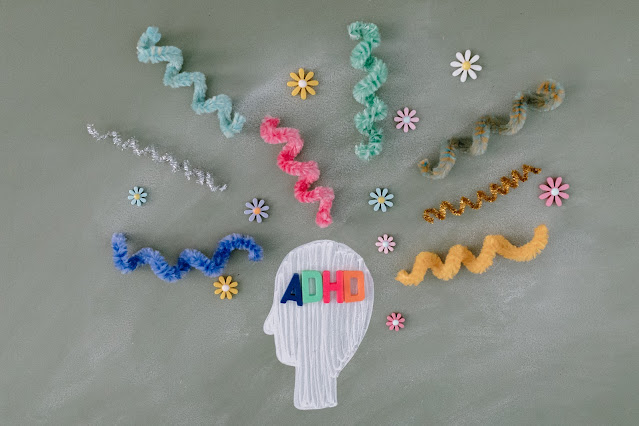ADHD, or Attention Deficit
Hyperactivity Disorder, is a neurodevelopmental disorder that affects people of
all ages. It can have a significant impact on daily life, but with the right
understanding and strategies, individuals with ADHD can unlock their full
potential and thrive.
What is ADHD?
ADHD is a complex brain
disorder characterized by persistent patterns of inattention, hyperactivity,
and impulsivity. It can affect a person's ability to focus, organize tasks,
manage time, and control impulses. While ADHD is often diagnosed in childhood,
it can persist into adolescence and adulthood.
Common
Symptoms of ADHD
The symptoms of ADHD vary
depending on the type, but common signs include:
- Inattention: Difficulty sustaining
attention, making careless mistakes, and organizing tasks.
- Hyperactivity: Excessive fidgeting,
restlessness, and difficulty sitting still.
- Impulsivity: Acting without thinking,
interrupting others, and difficulty waiting.
Types of
ADHD
ADHD is not a
one-size-fits-all condition. There are three main types:
- Predominantly Inattentive Presentation: Characterized by difficulties with
focus and organization.
- Predominantly Hyperactive-Impulsive
Presentation:
Characterized by hyperactivity and impulsivity.
- Combined Presentation: Features both inattention and
hyperactivity-impulsivity.
Causes and
Risk Factors
The exact cause of ADHD is
not known, but it's believed to involve a combination of genetic,
environmental, and neurological factors. Risk factors may include a family
history of ADHD, premature birth, exposure to toxins, and maternal smoking
during pregnancy.
Diagnosing
ADHD
Diagnosing ADHD involves a
comprehensive evaluation by a healthcare professional. It typically includes a
detailed medical history, symptom assessment, and consideration of the
individual's age and circumstances.
Strategies
for Managing ADHD
Managing ADHD often requires
a multimodal approach. Strategies may include:
Medication
Options
- Stimulants: Like methylphenidate and
amphetamine-based medications, can help improve focus and reduce
impulsivity.
- Non-Stimulants: May be recommended if stimulants are
not effective or cause side effects.
Behavioral
Therapies
- Cognitive Behavioral Therapy (CBT): Helps individuals develop coping
strategies, improve time management, and address impulsive behaviors.
- Parent Training: Equips parents with skills to support
children with ADHD.
Lifestyle
Changes
- Regular Exercise: Physical activity can help reduce
hyperactivity and improve concentration.
- Healthy Diet: Nutrient-rich foods and omega-3 fatty
acids may benefit individuals with ADHD.
ADHD in
Children
Early intervention is
crucial for children with ADHD. Parents and educators can collaborate to create
structured routines, provide clear instructions, and offer positive
reinforcement.
ADHD in
Adults
ADHD can persist into
adulthood, affecting work, relationships, and daily life. Adults with ADHD can
benefit from therapy, medication, and self-help strategies.
Coping
Strategies for Individuals with ADHD
- Time Management: Using calendars and reminders.
- Organization: Keeping a clutter-free workspace.
- Mindfulness: Techniques to improve focus and reduce
impulsivity.
ADHD and
Relationships
Understanding ADHD is
essential for partners and family members. Open communication and empathy can
strengthen relationships.
ADHD in the
Workplace
Individuals with ADHD can
excel in the workplace with accommodations such as clear instructions,
structured tasks, and regular feedback.
Tips for
Parents of Children with ADHD
- Education: Learn about ADHD and available
resources.
- Consistency: Establish consistent routines and
rules.
- Support: Seek support from professionals and support groups.
Conclusion
ADHD is a complex but
manageable condition. By understanding the symptoms and employing effective
strategies, individuals with ADHD can unlock their potential and lead
fulfilling lives.
FAQs
- Is ADHD a lifelong condition?
- ADHD can persist into
adulthood, but its impact can be managed with appropriate strategies and
support.
- Can medication cure ADHD?
- Medication can help manage
symptoms, but it's not a cure. Behavioral therapies and lifestyle changes
are also important.
- What are some non-medication approaches
for managing ADHD?
- Non-medication approaches
include cognitive-behavioral therapy, exercise, and a healthy diet.
- How can parents best support a child with
ADHD?
- Parents can provide
structure, clear expectations, and access to appropriate interventions.
- Can adults develop ADHD later in life?
- While ADHD is often
diagnosed in childhood, it can be diagnosed in adults who exhibit
symptoms.
Unlocking the potential of
individuals with ADHD involves understanding, empathy, and a multidimensional
approach. With the right strategies and support, those with ADHD can thrive in
all aspects of life.
